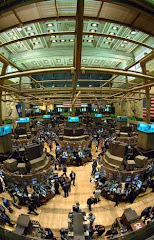 By Lisa Yates
By Lisa YatesEditor
Can’t get a loan?
Borrowers who normally would have no trouble obtaining loans are feeling the pinch, too.
Even mega-companies like General Electric have become concerned about getting credit. Recent reports said the company considered seeking a bank charter to give it access to government lending channels.
Although the U.S. Federal Reserve flooded markets with emergency money and lowered its benchmark interest rate by 3.75 percentage points in the span of 13 months, banks are reluctant to lend money. It’s the same for central banks around the globe.
 Banks are reluctant to extend credit, because they are paying the price for previous lending mistakes.
Banks are reluctant to extend credit, because they are paying the price for previous lending mistakes. As that slows economic growth, companies will cut jobs, meaning more people may miss payments on mortgages, credit cards and auto loans, driving up bank losses and forcing them to clamp down even harder on lending.
Once that cycle gets going, it is difficult to stop.
That’s why the world’s richest nations – the G-7 – met on Oct. 10, in Washington, D.C. These finance ministers from the U.S., Canada, France, Germany, Italy, Japan, and the U.K. met to discuss the situation.
They all agreed to do whatever it takes to restore normal order to credit markets that have essentially shut down.
In the U.S., more plans are in the works, including a partially nationalizing the banking system.
U.S. Treasury Secretary Henry Paulson has indicated that the administration will use part of the recent $700 billion bailout President Bush signed Oct. 3, to have the government take ownership stakes in banks. That unprecedented move is just one more attempt to boost confidence and get banks back in business.

The global economy is drawing closer to a dangerous downward spiral and time may be running out for world leaders to find a way to stop it before it inflicts lasting damage.
Most banks are safe and sound, but these unprecedented times are affecting everything that has to do with banking.
Is the credit crunch a Wall Street-only issue?
It depends on who you ask.
According to a recent Senior Loan Officer Opinion Survey on Bank Lending Practices from the Federal Reserve System, around 65 percent of domestic banks said they have tightened their lending standards for commercial and industrial loans to small firms over the past three months.
The National Federation of Independent Businesses' most recent Small Business Economic Trends reported differently. Thirty-four percent of the survey's respondents reported regular borrowing activity. Only, 10 percent said loans are getting harder to land. Two percent of the owners polled cited the cost and availability of credit as their number-one business problem.
Still, most agree – what’s going on in the financial markets is not helpful to small businesses.
After years of fast and loose lending, major banks have begun tightening standards for loans to small businesses -- often described as the backbone of the jobs market. That is making it harder to gain funding for anything from buying equipment to hiring new workers.
Many small businesses are seen heading for trouble because they used home equity loans to fund their businesses during the housing boom, saddling themselves with too much debt in the process.
With home prices dropping, some small business owners are now left with properties worth less than the money they owe the banks.
Certainly, these are tough times for small businesses in Southwest Louisiana, which were also affected by recent hurricanes.
Southwest Louisiana has always been an area of family-owned meat markets, dry cleaners, diners and corner stores. Small businesses like these are not just part of our economy – they are a part of our community’s identity.
They also tend to be the most vulnerable.
